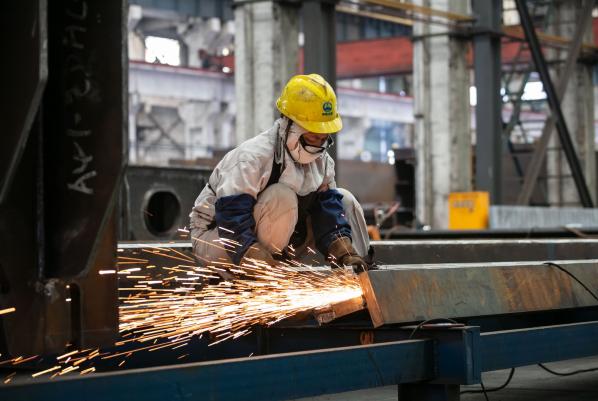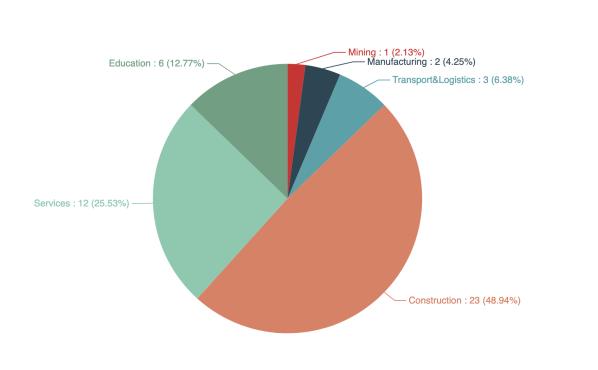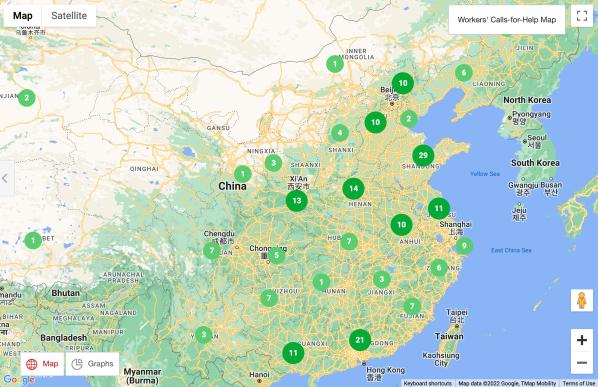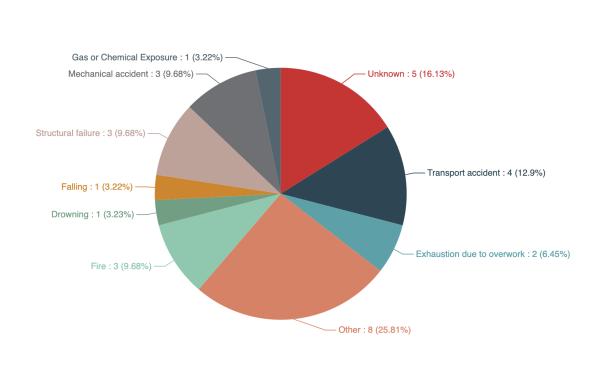
Photograph: humphery / Shutterstock.com
China’s economic troubles are revealed in China Labour Bulletin’s data on labour challenges that workers face. According to data collected in August 2022 in our Strike Map, Workers’ Calls-for-Help Map, and Workplace Accident Map, the effects are particularly acute for migrant workers in the construction sector and in the steel and coal production industries.
But first, don’t miss the content CLB has published recently:
- Can workers be shorted workplace injury compensation by being held partially at fault for the accident? In this legal case study, a worker we call Xu was not properly trained for his manufacturing job and became injured, requiring surgery and months of recovery. His employer assigned a portion of the blame to Xu as a warning to other workers, meaning that a portion of Xu’s workplace injury compensation was his financial responsibility. A social worker who spoke with CLB explained that Xu - and his family who have stepped in during his recovery period - have few options in the face of local interests and barriers to accessing the legal system.
- Food delivery driver stabs self in protest over fines and unpaid wages. This unfortunate incident was reportedly in response to the worker being fined after resigning and requesting his unpaid wages, but his manager went on record saying that the fine was for participating in a strike. Either way, China’s Labour Contract Law stipulates a notice period of 30 days for a worker’s resignation, yet in the absence of that, deducting wages is illegal, and a fine is also presumptively invalid.
- CLB Report: Waiting for Weiquan: Worker rights protection at the All-China Federation of Trade Unions. Based on CLB’s data collection and interactions with workers over decades, we know that workers in the vast majority of labour disputes do not seek help from the trade union. Workers often tell us, “I don't know how finding a trade union can help resolve my demands.” In this report, we analyse over 100 individual cases of labour rights violations to assess the union’s response to workers seeking union assistance. We make several new findings and recommendations for how the union can broaden its scope of rights protection beyond the outsourcing of legal services.
- August 2022 labour news roundup: Youth unemployment at a record high for fourth consecutive month. In our monthly summary of labour-related headlines in China, we cover the following topics: “Frictional unemployment” describes young people’s job prospects; live streamers experience labour disputes and excessive working hours; hospitals in financial crisis cannot pay wages and benefits; real estate recession leads to layoffs in the steel industry; truck drivers on China’s “green passage” face challenges; and workers suffer under extreme temperatures.
Migrant workers in construction and mining sectors take action against wage arrears
China’s real estate industry going into recession is evident in both CLB’s Strike Map and Workers’ Calls-for-Help Map, with many wage arrears incidents in August 2022 related to property construction and development. A development company called Greenland Group saw workers post online about wage arrears in Taiyuan, Shanxi province, and stage a sit-in strike in Xi’an, Shaanxi province. In Qingdao, Shandong province, over 100 workers were owed wages for renovation projects at a housing development.
At a Vanke property in Xi’an, workers posted online that over twenty workers had completed work on the interior walls and roof of a property in July 2021, but the manager of the construction company was only willing to settle the wages for the work on the walls. In April of 2022, workers sought out the project manager to negotiate resolution but received no reply. The workers were owed 770,000 in wages, and by the time of their posting, they were in great financial distress as a result of the ongoing pandemic and their children starting the school year.
Meanwhile, the official trade union in the city of Xi’an has been carrying out activities aimed at migrant workers and their children, including organizing trips for the children to visit the construction sites where their parents work, and hosting craftsmanship competitions jointly with construction companies. However, these activities have not reduced wage arrears or ensured that migrant children have access to education.
China’s steel and coal industries are facing production cuts and layoffs, and this was indicated in our mapping data, particularly in Henan province. CLB previously reported on Henan Anyang Iron and Steel Group notifying employees that the company would reduce salaries by 30 percent starting in August and bonuses and benefits would also be affected. Elsewhere in Anyang, almost 100 coal miners raised a banner to protest wage arrears and unpaid insurance benefits for over ten years at the Xinlong Coal Mine. The special police unit was dispatched in the same area, reportedly related to this protest.
Summary of CLB Data



